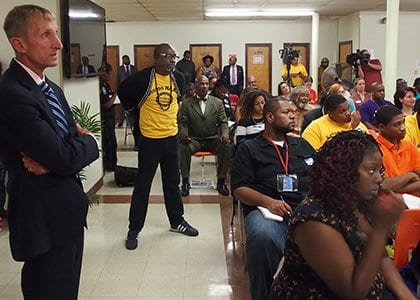
The teens’ complaints are not new to the police. Many of the officers, especially the black males, have lived through the same experiences: Cops being rude, stopping and patting them down with seemingly little pretext, threatening violence.
What’s different about this conversation, organized by the Center for Teen Empowerment, is who’s in the room. Standing in the front of the room in the basement of Roxbury’s 12th Baptist Church are Commissioner William Evans and much of his command staff.
One of the teens launches into an ice-breaker exercise aimed at getting dialogue going among the participants.
“Stand up if you’ve ever been handcuffed,” he says. More than a few people stand, including some of the officers.
“Stand up if you’ve ever been in a jail cell for more than an hour,” he says. Now it’s mostly the teens standing.
“Stand up if you’ve ever been suspended from school.” Now nearly everyone in the room is standing.
Later, the teens and police officers broke out into groups to talk. The conversations were frank and direct. The teens talked about their problems with police. The police talked about the challenges they face. Their message, as Evans said in his remarks to the group: “We’re here for you. We’re not against you. Our mission is to make your neighborhoods as safe as possible.”
The news of the police shootings and civil unrest in Ferguson, Mo. provided contrast to the Boston department’s relations with the community, as Evans pointed out.
“They have a police force that is majority white and they’re policing a population that is majority black,” Evans noted, pointing out the heavily black and Latino contingent of command staff officers who accompanied him to the meeting.

Author: Banner photoBoston Police Superintendent in Chief William Gross addresses the gathering at the 12th Baptist Church. (Banner photo)
“We are from the community,” said Superintendent in Chief William Gross. “We grew up in this community too.”
The annual gathering hosted by the Center for Teen Empowerment is aimed at improving relations between police and teens in Boston. A crowd of about 80 teens sat attentively, listening to the officers’ presentations and to other teens talking about their relationships with police.
State representatives Byron Rushing and Evandro Carvalho and City Councilor Tito Jackson were in attendance.
While the youth participants expressed appreciation for the police officers’ attendance at the meeting, many said the city has a long way to go in improving the department’s relationship with the community.
“They come up to you, they’re rude, they expect you to respect them, but they don’t respect you,” summed up youth organizer Tiarra Perez. “If you don’t do everything they ask, they can put you in the back of their cruiser. They can lie and put charges on you.”
But Perez adds, “I know it’s not all officers. Some of them grew up in the same communities we did.”
Gross said youth-police dialogues like the one hosted by the Center for Teen Empowerment are effective in breaking down barriers between the police and the communities they serve.
“It’s one of the best ways to find out what we have in common,” he said.
The department has begun to incorporate more interaction with community residents into the curriculum at the Police Academy, according to Gross.
“The way we’re teaching at the Police Academy is totally different now,” he said. “It’s all about community policing. We want to make sure that when police go into a community, they’re not desensitized to the kids.”
Gross noted that police substations in Roxbury, Dorchester, Mattapan and the South End assign clinical social workers to the families of youths who are arrested.
“They help the families get services,” he said. “They don’t report back us. They help the families.”
Gross and other police officials say their efforts have had a positive effect on crime.
“Last year we had 38 homicides,” he said. “Every other city the size of Boston in the country had over 200. One homicide is too many. We still have to work to drive the numbers down.”
Rep. Rushing said the Center for Teen Empowerment’s event was an important step in maintaining positive police-community relations.
“One of the things we’re learning from Missouri is that nobody was talking to anybody,” he said. “I think it’s important when political leaders and police meet and know each other. All of the community should have this, so people know who to talk to when things get heated. People have to know who to call.”







